The largest open-air landfill in Latin America is closing down
In touristy Dominican Republic, over 4,000 tons of waste are unloaded every day in the Duquesa garbage dump
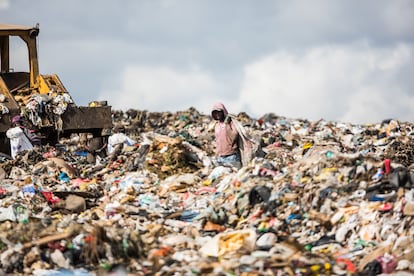

Duquesa, located in the Dominican Republic, stands as the largest open-air landfill in Latin America and the Caribbean, accumulating decomposing waste for over 30 years. As far as the eye can see, mountains of garbage emit an unbearable stench, along with toxic liquids and methane. According to the Inter-American Development Bank (IDB), it’s the world’s fifth-largest landfill, after Jakarta, Nairobi, Lagos and the Great Pacific Garbage Patch of floating waste and plastic. “It’s the largest ‘structure’ in the country,” said Catherina Falkner Olmedo, the IDB’s representative in Santo Domingo. The waste keeps piling up every day. Hundreds of trucks unload around 4,000 tons of garbage from around the Santo Domingo metropolitan area. Everything from dolls, armchairs and shoes to nail polish and yesterday’s leftovers get thrown in together. Plastics, organic waste, cardboard, metal and chemicals all end up in this noxious mix.
Duquesa is where Esterio works. He’s a Haitian migrant who arrived in the Dominican Republic in 2011, escaping a life of insecurity and deprivation back home. He’s a “diver” — the local name for the scavengers who pick through the landfill every day to collect cardboard, plastics and metals that they can sell to recycling companies. Esterio specializes in plastic and paper. Can he make a living from this? “Yeah, thank God! It’s way better than being on the street. It’s a job that never lets you down. If there’s garbage, there’s work. And you can’t even look for a job without papers, right?” He starts work every day at six and finishes by noon. He has set up his own schedule to earn $5-$17 a day, depending on what he finds. “You can come here whenever you want. There’s no schedule.” He sits down in the shade under a tree and takes off his latex gloves. “You can’t do it without gloves, because there are broken bottles and you could cut yourself. And there are dead dogs and all that crap.”
The shutdown of Duquesa began in March and will take five years if all goes as planned. The government envisions turning the landfill into a large, well-maintained park with no environmental hazards. The focus is on preventing toxic substance leakage into subsoil and water, and minimizing gas emissions. Efforts have been made to establish accessible roads for waste disposal and fill holes to level the ground, instead of creating garbage mountains. A new landfill site with better security is being sought. The project, a collaboration between the Inter-American Development Bank and the Dominican government, aims to include a facility for separating and recycling materials. The estimated cost for this project is around $110 million, and will be funded by loans from the IDB ($44.2 million), the Japan International Cooperation Agency ($45 million), and the Spanish government ($20 million).
“The country’s growth depends on tourism and no tourist wants to see garbage.”Catherina Falkner Olmedo, Inter-American Development Bank (IDB)
“People have been demanding the shutdown of Duquesa for years because of all the uncontained trash fires,” said Mercedes García Marín, a project manager with the Spanish Agency for International Development Cooperation (AECID) in the Dominican Republic. It was not uncommon for the smoke to reach Santo Domingo, which is a mere eight miles (13 kilometers) from the dump. Adjacent to Duquesa are communities like Esterio’s, where most people scavenge in the dump for a living. Surprisingly, Duquesa and the 239 other landfills were not a political issue until April 2020 when a huge fire drew attention to this longstanding problem. “It opened the eyes of many people,” said Falkner. “The country’s growth depends on tourism and no tourist wants to see garbage. We met with the government to address the complexity of the issue, which spans production, consumption and a recycling culture, which is lacking here.”
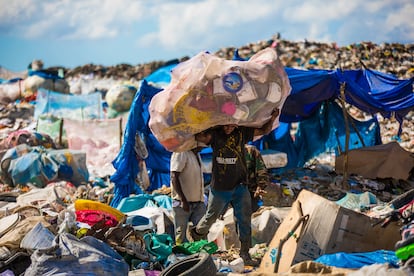
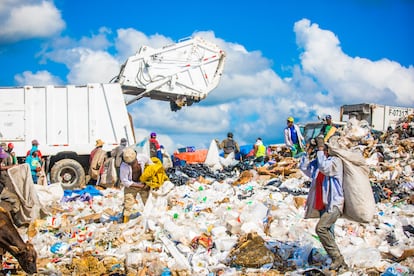
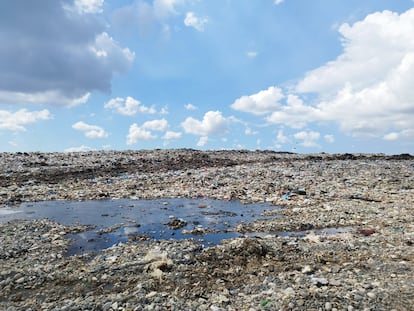
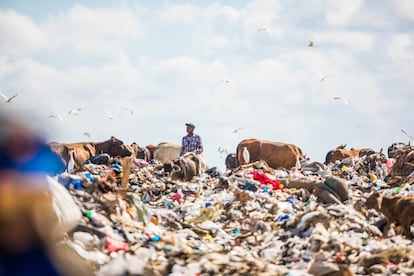
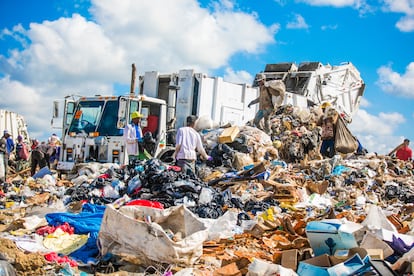

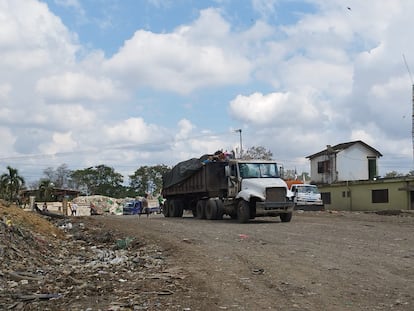
Mercedes García Marín agrees. “The country relies heavily on tourism, but less than 20% has proper sewer systems and only 5-10% of the water is treated. This leads to pollution of the sea and soil. Every community has a landfill, and some people even resort to burning garbage in the streets. Waste that cannot be burned is just dumped anywhere.” Walking through Santo Domingo and the nearby town of San Cristóbal confirms this fact. Indhira de Jesús, Vice Minister of Environmental Management, is well aware of this reality. “Dominicans just throw their garbage anywhere. It’s all about citizen education.”
“Waste has always been seen as a municipal problem, and in a country where the focus is on the president, municipalities often don’t get enough attention.”Indhira de Jesús, Vice Minister of Environmental Management, Dominican Republic
The vice minister says it’s crucial to make progress in closing the Duquesa landfill while people still remember the 2020 fire. She believes it will also encourage the closure and improvement of other landfills, promote better garbage sorting and recycling practices at home, and foster greater acceptance of waste management fees. “Waste has always been seen as a municipal problem, and in a country where the focus is on the president, municipalities often don’t get enough attention,” she said. But in a small country with a growing population — 11 million inhabitants, according to the World Bank —, she says, “it’s getting harder to hide garbage where no one can see it.”
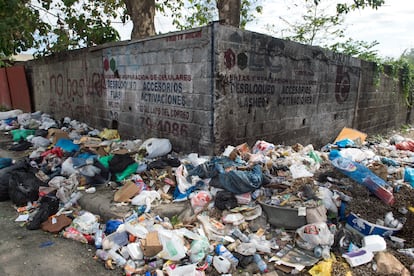
An uncertain future for Haitians
A thousand other divers like Esterio work at the landfill sorting through trash that can be recycled. Approximately 80% of them are undocumented Haitians who are unable to find formal jobs. ”You used to be able to live here [in the Dominican Republic], but now there’s more racism and if you don’t have papers, you can’t even go out,” said Esterio. He has heard about the plans to close down Duquesa, but doesn’t know any details. He has many questions and few answers. An uncertain future lies ahead for him and every other scavenger who lives off the Duquesa trash. “It’s going to be a problem, you know? What are we supposed to do? Steal or just live in misery?”
“With the closure, people lose their livelihood,” acknowledges Falkner. “80% of the collectors are Haitian, and most of them are undocumented. The goal is to provide these families with a decent life: work, income, healthcare, education and basic infrastructure.” She suggests introducing training and regulations for recycling work. However, in order to formalize this type of worker, a census is needed to identify them and their work locations. Falkner says this initiative could be partially financed by the International Organization for Migration’s development fund.
“The new recycling plant will be able to employ some of the current divers,” said Indhira de Jesús, but not everyone. “The recycling sector has plenty of folks who can get jobs if we give them the right training,” she said. However, she declined to comment on specific plans for undocumented Haitians, as any residency normalization process during the Duquesa shutdown might be contentious.
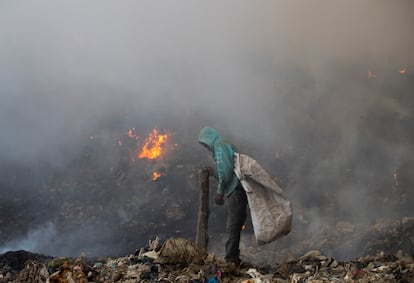
Migration from the neighboring country always sparks controversy in the Dominican Republic. Human rights organizations accuse the authorities of a racist and xenophobic policy toward Haiti. In December 2022, the United Nations High Commissioner for Human Rights, Volker Türk, urged Dominican Republic authorities to intensify efforts in preventing xenophobia, discrimination, and related intolerance based on national origin, race, ethnicity or immigrant status. Türk also called for halting deportations to Haiti due to the ongoing humanitarian and human rights crisis in that country. “I am troubled to see that forced returns of Haitians to Haiti from the Dominican Republic are continuing” said Türk.
Dominican authorities have denied the allegations. About the future of the Duquesa scavengers, de Jesus would only say, “The social aspect will be a distinctive feature of the project.”
“The landfill shutdown is positive for the environment, but we need a plan to help people who have been working there for decades to transition into new roles.”Robinson García, president of a national trash scavenger organization in the Dominican Republic
A national trash scavenger organization has tried to approach Duquesa workers to see how they can help in the transition. “So that things don’t get hard for them,” said Robinson García, the organization’s president. “The landfill shutdown is positive for the environment, but we need a plan to help people who have been working there for decades to transition into new roles. It’s the government’s responsibility,” said García. “If not, we just solve the environmental problem and create another one.” The organization has offered to assist authorities in training divers and ensure a smooth transition. They want the divers to be viewed as the recycling plant’s partners, not just employees. But so far, no one knows what their role will be, if any.
García says that Dominicans and foreigners with legal residency working in Duquesa are already getting organized. But Haitians without papers cannot join the association. “Sooner or later, they’ll face trouble and we’ll be there to defend them however we can. But there’ll come a time when we just can’t anymore.”
Sign up for our weekly newsletter to get more English-language news coverage from EL PAÍS USA Edition
Tu suscripción se está usando en otro dispositivo
¿Quieres añadir otro usuario a tu suscripción?
Si continúas leyendo en este dispositivo, no se podrá leer en el otro.
FlechaTu suscripción se está usando en otro dispositivo y solo puedes acceder a EL PAÍS desde un dispositivo a la vez.
Si quieres compartir tu cuenta, cambia tu suscripción a la modalidad Premium, así podrás añadir otro usuario. Cada uno accederá con su propia cuenta de email, lo que os permitirá personalizar vuestra experiencia en EL PAÍS.
¿Tienes una suscripción de empresa? Accede aquí para contratar más cuentas.
En el caso de no saber quién está usando tu cuenta, te recomendamos cambiar tu contraseña aquí.
Si decides continuar compartiendo tu cuenta, este mensaje se mostrará en tu dispositivo y en el de la otra persona que está usando tu cuenta de forma indefinida, afectando a tu experiencia de lectura. Puedes consultar aquí los términos y condiciones de la suscripción digital.








































